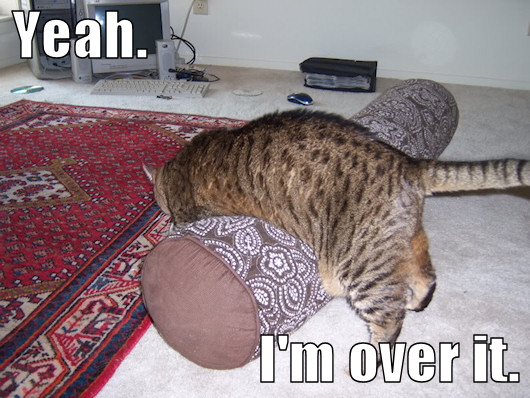Cortisol and the “I’m Over It†Method of Therapy
July 22, 2011
Chronic stress is a nasty beast. Stress elevates cortisol and chronically elevated cortisol contributes to disease and illness in a major way (not too mention making you pudgy).
Read more about cortisol here: 1, 2, 3.
Image Credit: TrollCats
This summer, I’ve been working full time, and as such, am finding it harder to manage my lifestyle to reduce stress. In my opinion, a big part of managing stress effectively is doing your best to optimize what you can (sleep, overtraining, diet), and releasing what you can’t (workload in the office, politics). Jump for more.
A few years ago, arrangements at school forced me to spend a fair amount of time with a guy I didn’t like a whole lot. One of the things I didn’t like about him was his overuse of a phrase I found particularly grating. Whenever he didn’t want to deal with an issue, he’d proclaim “I’m over it.†It meant the conversation was over and the topic at hand no longer concerned him. Though I found it entirely aggravating, I think it is an incredible tool for handling stress.
When I work on a project in the office, it’s easy to let the tensions built up in the cubicle or boardroom follow me out the door. I find myself especially irritated by crawling traffic, and notice extra tension in my shoulders all the way to bedtime (and even beyond). I quickly decided that I do not want to waste my leisure time wound up about issues beyond my control at the moment. Taking a page from the guy I don’t like playbook, I now spend a minute reminding myself that I’m over it before I even get to my car in the parking lot.
Stress: Release vs. Defeat
We’ve all heard of the “fight or flight†response – the way we handle the acute stress we feel in situations like when a bear has you at gunpoint (I think I got that right). As Chris Kresser points out, psychologists have a term for how we handle chronic stress: the “defeat response.â€
We don’t want our stressors to wear on us all day, and we don’t want them to beat us; we want to release our stress.
This is why I say “I’m over it†to myself instead of saying “whatever.†To me, “whatever†applies when the situation is hopeless or beyond saving. “I’m over it†is simply recognizing that the stressor is not important to you.
What is important?
Ten years from now, you will still care whether you have a spare tire and a pharmacy in your bathroom mirror. You will not care who won the argument about the best course of action for some supply chain issue in a Tuesday afternoon meeting a decade prior. In other words, you’ll be over it.
Make it conscious and current, release your stress and say “I’m over it.†You’ll be happier, healthier (and prettier) for it.



What’s Being Said